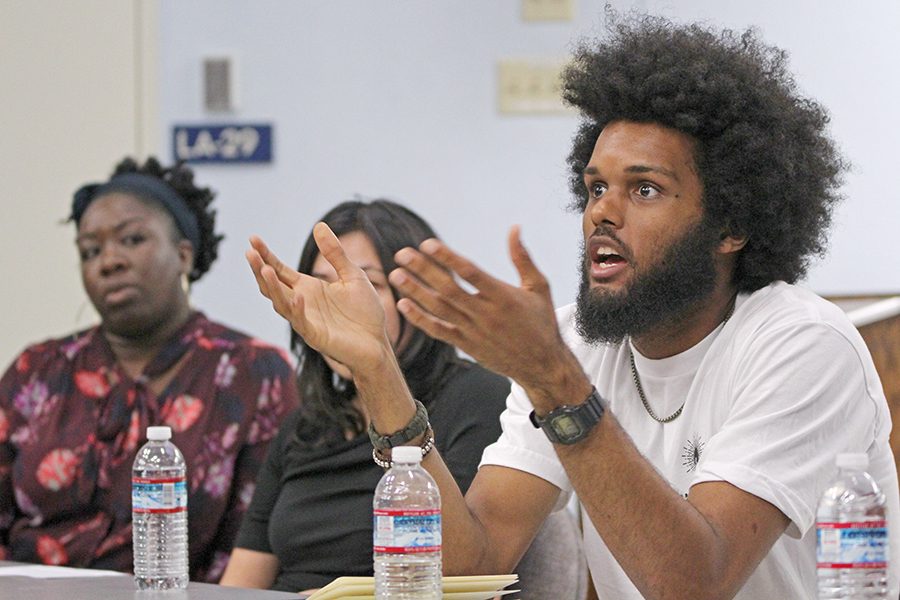Panel aims to expose ‘New Jim Crow’ era
Prison-industrial complex imprisons minorites at higher rates, provokes backlash
Christian Urrutia / The Advocate
Berkeley Copwatch member Marcel Jones (right) speaks to the audience during the “Mass Incarceration Panel” event held in LA-100 on April 7.
Apr 24, 2016
The “Mass Incarceration Panel” event, organized by English professor Dickson Lam, was held in LA-100 on April 7 and was attended by more than 40 people.
Lam said his class has been reading “The New Jim Crow” by author Michelle Alexander. He said the point of the event was to bring awareness to the campus about the issues with mass incarceration.
Mass incarceration is the imprisonment of a large number of people, Lam said.
The U.S. has the highest rate of incarceration in the world. People of color are affected disproportionately by the penal system because of racial discrimination.
He compiled a group of six panelists to talk about what they do as well as the penal system, mass incarceration and discrimination against people of color and formerly incarcerated people in general.
Only one panelist did not show up.
Alexander writes about the new “under-caste” and the restrictions put on incarcerated people, Lam said.
In her book, mass incarceration is the new Jim Crow, because people coming back into the community are denied rights everybody else has, such as housing or work.
He showed a two-minute long video that showed statistics about the topic.
According to the video, 68 percent of all African-Americans who drop out of high school end up in prison.
One in nine African-American children has a parent either in prison or on parole.
The video states that incarceration can become a trait that is passed down from generation to generation.
A member of the Berkeley Copwatch, Marcel Jones was one of the panelists.
He said, “Even though you can kill Jim Crow, he will still exist.” Since 1990, more than 50 percent of the black population in Berkeley has been “kicked out,” Jones said.
According to the Berkeley Police records, African-Americans and Latinos were 7.5 times as likely to be stopped while in a car by a police officer than drivers of other races, he said.
Contra Costa County public defender Ji Seon Sung said while all people make the same mistakes while driving, including herself, she has seen more African-Americans pulled over than any other race.
“What is disturbing is that it is not an accident that people of color are so much more common in the (penal) system,” she said.
Sung said that her clients are often refused government support because of their criminal records.
She wants more people to understand while 10 percent of Contra Costa County is African-American, only two percent of juries are African-American.
Sung said many of her clients would go to court “all locked up” and handcuffed. She can’t believe that prisons are an accepted part of society.
RYSE Center Youth Justice Director Stephanie Medley said many people who have been in prison leave a burden on their family members.
If they move back in with their families, she said the landlords will often find an excuse to kick the whole family out because of the one person’s criminal record.
To make enough money, formerly incarcerated individuals have to turn to “things many would consider illegal” to provide for their families, which in turn, lands them back in prison.
“The new Jim Crow is when you break families apart,” Medley said.
Nursing major Robert DeMesa said he thought the forum was educational.
Student Cynthia Anderson said she would have liked more questions faster after the panelists finished talking about themselves.


